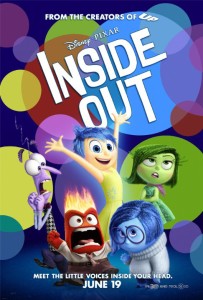August 13, 2015 at 8:18 am, by Carl
This is my third post about Pixar’s latest movie Inside Out. The movie is a charming study on “how to become mature, how to take on responsibility, and become reliable while at the same time preserving your childlike wonder.” Brad Bird, of Pixar, said that in a planning meeting on the movie when it was very early in production.
I really enjoyed the movie and immediately had some thoughts, some take-aways from the film. The first one that I wrote about was the movie shows “there is so much going on in the mind, the emotions of a person that no one ever gets to see.”
Secondly, my next post dealt with the fact that “each person you deal with on a day-to-day basis is the product of events that you don’t know about.” So, don’t be too quick to judge, while at the same time it helps us if we let others in on both our current emotions and the events of our life that lead us to view current issues or moments a certain way.
Thirdly, I was really captured by how the movie did a masterful job in showing how easy it is to get trapped into a certain emotion, or even no emotion. In other words, the movie showed How easy it is to get lost, to become numb to emotions or get generally trapped in one way of feeling/viewing life.
In the story, as the young protagonist tries to navigate her way through a changed world, one bad day ended up taking her to a somewhat numbed feeling where she was absent of emotion. This leads the story to a series of events before the climax of the story where she almost makes a decision that could have altered her life longterm. Of course, grace is always possible and even after making a major, yet poor, choice in life, one can always move forward.
Yet, we don’t always do so. Instead, one can become lost. The young girl is shown ultimately losing connection with her old core memories and finding herself adrift, begins to wonder about her place in the world, her place with friends or even her place with her family.
It wasn’t years of disaster. It was a few days. And it can happen just that quickly. Without quick intervention by loved ones, it would be easy for her, for you or me, to drift into a dark place. I have long dealt with issues of depression, with one marked time in my life while in grad school that I had a near-emotional breakdown. I spent three full days closed up in my apartment, blinds closed, feeling the walls closing in. I didn’t know it then, but had I lingered in that state, like the young lady in the movie, the world could have become an increasing dark grey from which I could have been trapped.
Fortunately for me, dear friends, including my roommate who remains an important friend in my life, came and rescued me. I am still a roller-coaster person (ask my wife) and one of my close college friends loved reminding me that I was “moody, but cute.” I suppose the cuteness factor helped her put up with my incessant mood swings. Even today, I can find myself drifting into times of some darkness as I feel like life no longer makes sense.
So, again, it is easy to get lost and/or become numb to emotions.
By the same token, the movie also gave a nice picture to an addendum to the point…and that is that some people can become dominated by one certain emotion. I’m not fully sure the filmmakers meant it this way, but when the emotions of the mother and the father are displayed, the lead emotion is not the same Joy as in the daughter. For the mother, it is the blue Sadness and for the father it is the red Anger. For some other characters, whose emotions we only see briefly in the end montage, different emotions are at the fore.
Whether they meant it or not, I think its fair. As we go through life, events can hit in such a way that for the rest of life, a person is driven mostly by one main emotion. I don’t think that’s good or bad….though I think it could end up being a weakness to not be able to engage the full swing of emotions…however, it is a telling thing to note in oneself as well as in those around you.
When you do discover it, in yourself or in others, it doesn’t mean you need to fix it. As the movie showed, there was a weakness when, in the young daughter, one emotion tried to full run the show even to the point of excluding another key emotion. Rather, my point is that you realize that for this person (or yourself) to be seemingly led by one emotion, or “generally trapped in one way of feeling/viewing life,” they got that way through a series of events.
It’s not some weirdness in them. Nor does it typically have anything to do with you. As I said last time I wrote on this movie, be patient. Be respectful of all the past events that you simply know nothing about.
I hope you see the movie. If for no other reason, go see it to get a good glimpse at the wonderful inner workings of how God created the human with these emotions. Then, just to quote C.S. Lewis again, be amazed….you are not talking to “a mere mortal.” “There are no ordinary people.”














Leave a Reply
Inappropriate or irrelevant comments will be removed at an admin's discretion.